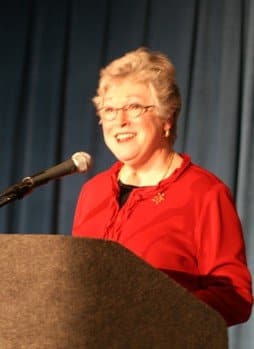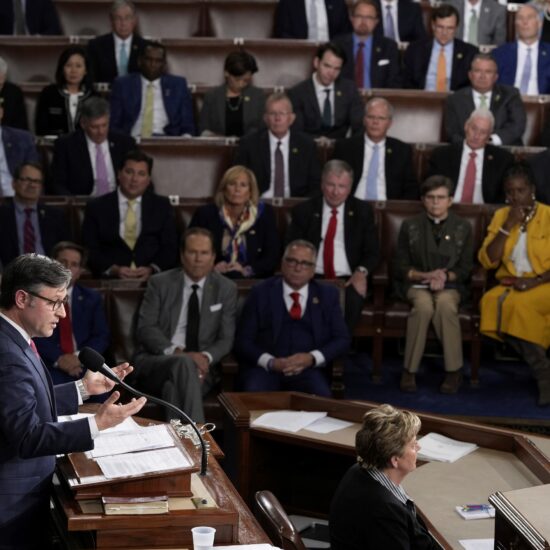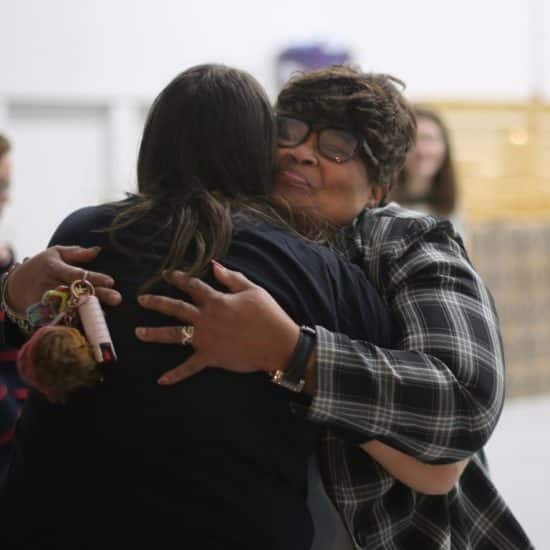TAMPA, Fla. (ABP) — Two decades after forming as a “new spiritual home place” for disenfranchised Southern Baptists, the Cooperative Baptist Fellowship now is “called as a movement of the Spirit,” the keynote speaker at a 20th anniversary celebration banquet said June 23.

Molly Marshall challenges CBF members to look forward at 20th anniversary banquet.
|
“No longer a denominational behemoth, Cooperative Baptists have learned that small and excellent can be used in the same sentence,” Molly Marshall, president of Central Baptist Theological Seminary in Shawnee, Kan., told more than 1,000 people celebrating the opening of the CBF’s 2011 General Assembly in Tampa, Fla.
Marshall, a former theology professor at Southern Baptist Theological Seminary who lost her job because she was unacceptable to new leadership in the Southern Baptist Convention in the late 1980s and early 1990s, said the Fellowship began as a “ministry of dissent” for those who recognized that Baptist principles were under attack.
“Reflection is good, but looking forward to what God is calling us to do is our task now,” Marshall said. “In this day, I think the greatest need of CBF persons is to trust that God’s Spirit continues to guide and empower our ministry, calling us to new horizons.”
“The Spirit works in freedom, calling the church to new forms of service in the world, and discerning that call is a demanding spiritual practice,” she said. To help, she outlined seven questions to be answered to gauge whether “CBF is called as a movement of the Spirit.”
— Is the pathway that we sense the Spirit to be prompting a way to live the gospel more fully? “CBF has matured in learning to go as well as send,” Marshall said. “Going as learners and friends rather than as experts has allowed sustainable relationships that are both reciprocal and post-colonial.”
— Will this require more faith, hope and love? “It is a profoundly hopeful task to start new things and then trust that God will prosper our work,” Marshall said.
— Are we persuaded that we cannot do this in our own strength? “We should stretch toward those goals that call us to do our best yet always require the power of the Spirit to accomplish,” Marshall said. “Why not water Malawi? Why not make a 20-year commitment to the poorest places? Why not be a voice for justice in immigration?”
— Will the pathway that the Spirit is nudging challenge all perceptions of how God is at work in the world? “If we know anything about the Spirit of God, it is that the Spirit of God is God’s creative impress and dynamic movement in the world, always transgressing boundaries of human invention,” she said.
Marshall said crossing boundaries sometimes makes people uncomfortable. “That’s usually a sign that the Spirit is in it, moving us forward,” she said. Such places currently in CBF life include gender equality in the ministry, interfaith partnership and issues of human sexuality. “We must talk about how wonderfully and fearfully made humans are,” she said.
— Will my community of faith grow in maturity as we become more deeply invested in the movement called CBF? “The old modes no longer work, and we’re called to a greater depth of trust,” Marshall said. “We’re in that time right now, aren’t we? What lies before us?”
“We mature as we risk ourselves for God and walk toward in faith what we cannot get,” she said.
— Will redeemed expressions of grace and mercy flow from following the pathway of the Spirit? “Poverty and transformation ministries of CBF propel us toward the least of these and help us recognize that we are among them as well,” Marshall said. “With the least, we learn God’s preferential option for the poor, those who know the meaning of grace and mercy.”
— Will this action be an authentic participation in the way of God? “God has been making us new over these past 20 years,” Marshall said. “We can think differently about collaboration. We can think differently about whom we might serve and who we might become, and the Spirit continues to move us forward so that we transgress the old boundaries and tear down old walls.”
The Cooperative Baptist Fellowship formed in 1991, a year after Daniel Vestal, at the time a pastor in Texas who has served as the CBF’s executive coordinator since 1996, lost his bid as the last moderate candidate trying to win back the presidency of the Southern Baptist Convention. The defeat solidified control of a theological and political machine called the “conservative resurgence” that elected a string of presidents committed to the doctrine of biblical inerrancy. Using their power to appoint only like-minded people to key committees, over time SBC presidents shifted the denomination’s bureaucracy from moderately conservative to fundamentalist.
While the SBC, the nation’s second-largest faith group, dwarfs the 1,800 partnering churches and 3,000 individuals that provide some level of support of the CBF, the breakaway group today helps support 15 theology schools with more than 2,000 students, has 135 missionaries on the field and has endorsed 635 chaplains and pastoral counselors.
The movement includes 18 autonomous state and regional Fellowships and numerous partner organizations that serve CBF churches but raise the majority of their own funding.
-30-
Bob Allen is managing editor of Associated Baptist Press.






